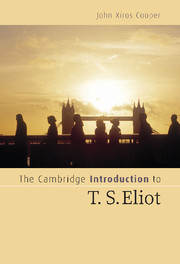Chapter 2 - Contexts
Published online by Cambridge University Press: 05 June 2012
Summary
Early influences
T. S. Eliot, as we have seen, was born on the banks of the Mississippi River in St. Louis and it is wise when considering his life and work to remember his American origins. He certainly never forgot them. He may have felt an abstract or ideal relationship to Britain and Europe, but St. Louis was, on the other hand, all too real. This was Eliot's first and most enduring context. In 1888 the city was still the gateway to the western frontier and a river city in close touch with the American South. The Civil War had not yet faded from living memory and the consequences of the South's defeat and the formal end of slavery were still very much in evidence. Although slavery had disappeared from the southern states, the systemic racism of American society as a whole, which persisted well into the twentieth century, colored every aspect of social life in St. Louis. The surrender of the South in the Civil War signified more than a political defeat; it also heralded the end of a closely knit, rural, and deeply communal society. It had been brought to its knees by the emerging industrial might of its northern adversary. Eliot's later social and cultural conservatism had its origins in the nostalgia for a South brought down by the disintegrative power of the industrial North.
- Type
- Chapter
- Information
- The Cambridge Introduction to T. S. Eliot , pp. 22 - 36Publisher: Cambridge University PressPrint publication year: 2006



